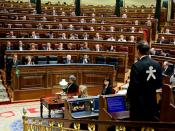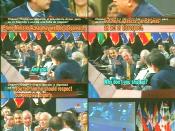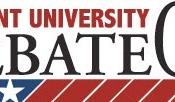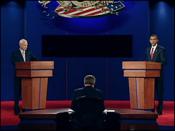By: Gibby95 The Debate Dissagreement In the American society we tend to resolve our differences by directly addressing our opposition by forms of debate. Throughout history, debate has been a tool of reform or what some may call reason, but; in recent years the argument has been made that our adversarial culture is in need of certain alterations. Early education generates the idea that creating an argument is essential to developing our originality, contributive, and intellectual views and standards. Unfortunately, our society has come to value the attack on certain judgments and developments rather than the integrated thoughts, feelings, and emotions of an argument. If our society will take steps to further our debate, instead of polarizing it, then our overall intellect will improve, because; modification of traditional ways of thinking can not only improve our intellect, but it can foster it to aid in all areas of our society and democracy.
Deborah Tannen, explores the current argument culture in our nation and specific conflicts within the adversarial ways of our society. Casual debates have become overheated debates, in which, "the temptation is great to oversimplify at best, and at worst to distort or even misrepresent others' positions" (Tannen 623). One will see these effects in all areas of interest from journalism to medicine. The media is always looking for an opportunity to report a good story, but good stories have changed over the years. Now anyone in a qualified position of employment must be extremely careful of distinguishing between his or her private and public lives; what once was private to most people is now becoming very public through the media; a direct attack on the person rather than their position seems to be the better story. Consequently, it is becoming more difficult to find someone willing to take on high qualified positions, "instead of enhancing reputations, going into public services now threatens them, whether or not the officials have done anything to be ashamed of" (Tannen 632). This media representation fosters a misconception of how one should act within society and what their agendas should indeed be directed toward.
One would assume objectivity is the best way to approach something one might be interested in critiquing, but; for a level of objectivity to exist then there must also be a level of "disinterestedness" (de Waal 664). Thus, people would need to be moral or have some sort of goodness about them, although; within the Western society one might argue morality rarely exists when it comes to the argument culture. For a person looking to critique a particular subject matter it seems they must indeed have that level of disinterest within them, but; we know that is not true because each person is searching for gratification or a certain appreciation only found through concern of one's own interests. "Moral emotions, in contrast, are disconnected from one's immediate situation: they deal with good and bad at a more abstract, disinterested level. It is only when we make general judgments of how anyone ought to be treated that we can begin to speak of moral approval and disapproval" (de Waal 664). Today people will harshly object to others, but in such a way, to make them the villains of society.
Tannen addresses the areas American argument culture can improve for the betterment of society. There are various problems with some of our basic ideals in a debate environment. Therefore, she discusses, Amitai Etzioni, a communitarian whom has developed ways for parties of differing views to communicate on a new productive level of dialogue. "His rules of engagement are designed to reflect-and reinforce-the tenet that people whose ideas conflict are still of the same community" (Tannen 638-9). Etzioni still leaves room for formal debate, but his ideas are not as cutthroat as debate is in the United States. It is acceptable to disagree with particular issues, but the way in which we critique one another is very important to our human connections, so we do not stress anonymity.
As a result, we must try to change a polarization of beliefs and attitudes. In the Japanese culture, for example, their way of approaching a discussion of conflicting opinions is to have more than only two people present for debate. It is important to have not only two points of view, but rather; have at least three perspectives, thus one person can act as mediator of ideas, equally supporting and criticizing the opponents. "If you limit your view of a problem to choosing between two sides, you inevitably reject much that is true, and you narrow your field of vision to the limits of those two sides, making it unlikely you'll pull back, widen your field of vision, and discover the paradigm shift that will permit truly new understanding." (Tannen 640). Our own beliefs are neither absolute nor irreconcilable in society.
If changes could be made to enhance our way of processing and presenting information, so that our differences in opinion did not present a ruthless tone, one might argue it cannot be easily done. Frans de Waal questions the fact whether people are inherently good and thus, moral. Although, he believes we are innately kind, many may disagree. "Virtue is absent from people's hearts and souls, and that our species is potentially but not naturally moral," can be made obvious through our argument culture (de Waal 662). But, some may argue, our argument culture is in reality no more than just a culture. Unfortunately, our culture is a way of life, with deeply rooted customs and traditions we each learn as adolescents that are held at high standards, each impossible to reject. "At the evolutionary level a behavior may be self-serving; at the psychological level it may be kind and unselfish;" either way, indeed behind our masks we might be inherently good, but the goodness could just be hidden by the need to conform to the culture of society (de Waal 656).
If our society was non-warlike from the start it may be much easier to make reforms in our argument culture, however; men have been the key orators in many aspects for centuries. Education has even taught men in ancient Greece to "search for the truth as an enterprise of oral disputation in which positions are propounded, defended, and attacked without regard to the debater's personal conviction" (Tannen 616). We are often taught through our education the intellects that debate and argue are more powerful and thus, successful. On the contrary, subjects of discussion are not always just black and white or true and false, but rather there is a gray area open for interpretation and the development of ideas and interests under many circumstances. A correct interpretation of Socrates would possibly change our habitual means of the argument culture and help intellectuals develop new insights.
In conclusion, there will always be a critic of any and all issues of importance to civil society, but; making changes and new developments to previously adopted ones is a much more difficult and long-term issue. Unless we try to make adjustments in areas of our education and democracy we will never know the possibilities of betterment for all ages, genders, and races in not only our argument culture, but all of civilization. The United States will need to make amendments starting in our first forms of education to see the overall changes and developments that can be made in the future of our democracy. Modification of traditional ways of thinking cannot only improve our intellect, but it can foster it to aid in all areas of our society.





